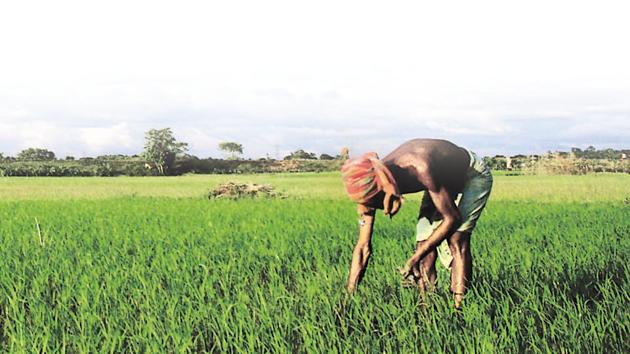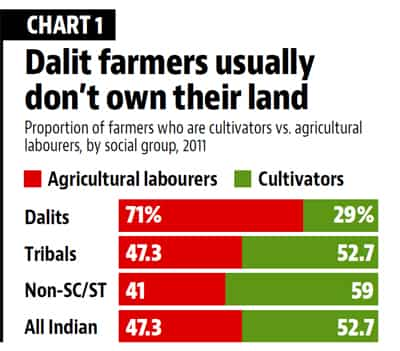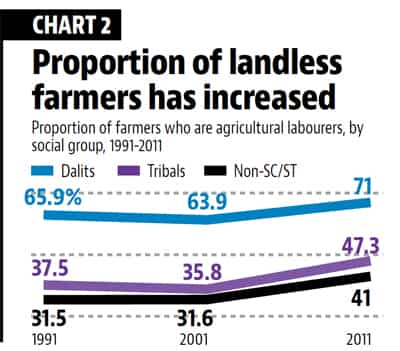Dalit farmers may fail to benefit from agricultural sops announced by govt
In an effort to relieve farmers’ economic distress, the Centre included in the Union Budget an increase in the minimum support price (MSP) for monsoon crops and pledged Rs 500 crore to Operation Greens, a programme to help growers of tomatoes, onions, and potatoes.
The benefits from the Union Budget’s concessions to agriculture will not be shared equally among Indian farmers.

Dalits, in particular, may lose out on the benefits, for the simple reason that they are much less likely than other farmers to own the land on which they work.
In an effort to relieve farmers’ economic distress, and with a view to pleasing rural voters before this year’s forthcoming assembly elections in eight states, the Centre included in the Union Budget an increase in the minimum support price (MSP) for monsoon crops and pledged Rs 500 crore to Operation Greens, a programme to help growers of tomatoes, onions, and potatoes.
“We all are worried about farmers and are working to double their income,” finance minister Arun Jaitley told Doordarshan in an interview after announcing the budget.
Yet such measures, economists say, are more likely to benefit farmers who own their land than those who work for wages. And while a majority of Indian farmers cultivate their own land, Dalit farmers in much of the country continue to work for wages, data released last week by the Census of India confirms.

The data shows that 71% of Scheduled Caste farmers are what the census refers to as “agricultural labourers” — that is, they work for wages on others’ land. That figure is much lower among other groups: 47% for Scheduled Tribe farmers and 41% for non-SC/ST farmers.
“We are thinking of the agricultural community as one group, and providing it with a number of sops,” said Nilanjan Ghosh, a senior fellow and head of economics at the non-partisan Observer Research Foundation in Kolkata. “But the benefit is essentially being obtained by landowners, and it hardly goes to the labourers. We don’t have anything for them.” Other economists agreed. “Any gains from these policies are unlikely to be passed down in terms of higher wages,” Ashwini Deshpande, a professor at the University of Delhi’s School of Economics, said in an email. “On the whole it would be safe to say that, by and large, these policies do not touch agricultural labour.”
Wages for agricultural labourers have not increased in the last four years, according to Himanshu, a professor at the Centre for Economic Studies and Planning at Jawaharlal Nehru University in Delhi. This, even as the Centre and states have introduced policies meant to alleviate farmer distress — loan waivers, crop insurance, and increased MSP, which ensure that farmers make a profit on their produce. “Even if big farmers or medium farmers have access to the minimum support price, it is not necessary that they will pass on that benefit to agricultural labourers,” Ghosh said.
“In fact, there is no such study which shows that agricultural labourers are going to be affected from an increase in the minimum support price or even from farm loan waivers.”
Landlessness among Dalits has deep historical roots.

For centuries, Dalits were expressly prohibited from owning land. Even if reforms after Independence have helped level the playing field, economic and social pressures over the last two decades have increased the proportion of landless farmers across all social sectors.
“The land is limited. As the population is increasing, pressure on land is also increasing,” Himanshu said. “It is expected that some increase would happen in the level of agricultural labourers over time.”
Regardless of caste or class, life is generally harder for landless farmers, according to Jayshree Sengupta of the Observer Research Foundation’s Economy and Development Programme.
“There is more incidence of suicides among agricultural labour than farmers/cultivators because they do not have access to any type of formal institutional loans and loan waivers have bypassed them. Around 70% of labourers are in debt,” Sengupta said in an email.
Get Current Updates on India News, Lok Sabha Election 2024 live, Infosys Q4 Results Live, Elections 2024, Election 2024 Date along with Latest News and Top Headlines from India and around the world.




